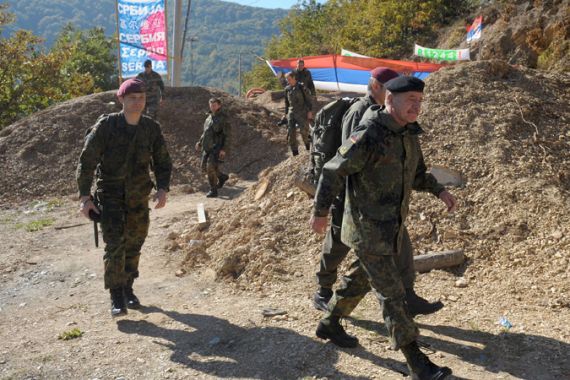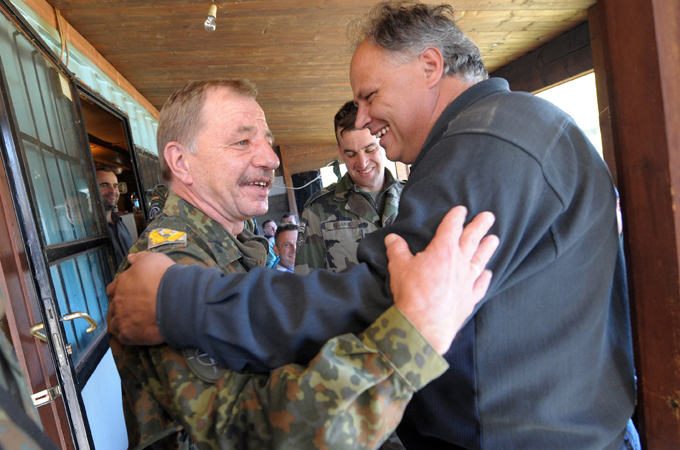Serbs refuse to remove Kosovo barricades
Negotiations break down as Serbs in northern Kosovo defies NATO demands to lift roadblocks erected in July.

 |
| KFOR commander Erhard Drews, left, said roadblocks would be removed unless the Serbs lifted them [AFP] |
Ethnic Serbs in northern Kosovo have defied NATO calls to remove roadblocks they set up nearly three months ago to stop ethnic Albanian leadership from extending its control over the part of Kosovo populated mostly by Serbs.
The Serbs have asked for troop and police deployment from Serbia and a meeting that had been called on Wednesday to resolve the crisis ended in failure, Al Jazeera’s Aljosa Milenkovic, reporting from Mitrovica in Northern Kosovo, said.
The standoff comes more than a decade after Serbian forces were driven from Kosovo by NATO bombs.
The barricades were erected in July by Kosovo Serbs – who do not recognise Kosovo’s 2008 independence declaration from Serbia – and stand on two disputed border points with Serbia.
Clashes broke out after previous attempts to remove them by NATO peacekeepers (KFOR), who have patrolled Kosovo since Serbian forces withdrew in 1999 and a UN administration took over. A European Union mission (EULEX) replaced it in 2008.
Al Jazeera’s Milenkovic said the meeting between KFOR and the Serbs had failed to produce results and that KFOR’s commander “left the negotiating table apparently not happy with the offer that the Serbs put on the table”.
He said the Serbs had offered KFOR full freedom of movement in northern Kosovo without lifting the roadblocks.
A declaration issued after a meeting of local Serb leaders said: “Serbia and the UN Security Council should facilitate the return of parts of the (Serbian) army and police and their deployment in Kosovo’s north.”
Negotiated solution
KFOR has so far not commented but its German commander, General Erhard Drews, said earlier he was disappointed with the Kosovo Serbs’ defiance.
He said peacekeepers would remove the roadblocks themselves unless the Serbs changed their minds.
Serbian media said Boris Tadic, the Serbian president, had earlier asked Serbs from Kosovo’s north to seek a negotiated solution with KFOR and to remain peaceful.
Serbia still effectively runs Serb-dominated northern Kosovo, but is under pressure to help resolve the impasse after the European Commission conditioned future EU accession talks on its co-operation with Kosovo’s government.
Local Serb leaders in Zubin Potok, some 100km north of Pristina and near one of the crossings, said the roads would remain blocked but agreed to talk to KFOR on allowing its supply convoys to reach peackeepers deployed there.
But they later accused KFOR of derailing negotiations by insisting EULEX vehicles also be allowed to reach the border. The Serbs fear EULEX will escort customs officials from Pristina to take over the border crossings.
“KFOR wants to resolve this by violence and it will be responsible for new developments,” said Radenko Nedeljkovic, the head of Mitrovica county.
Serbs have also asked Belgrade to end its European Union-sponsored talks with the Kosovo government in Pristina over practical issues such as flow of people and goods, ownership issues, energy supplies and travel documents.
Serbia lost control over Kosovo in 1999 following a 78-day NATO bombardment to halt the killing and expulsion of ethnic Albanian civilians by Serbian forces in a two-year counter-insurgency war.
More than 80 countries, including the United States and most of the European Union, have recognised the new country.